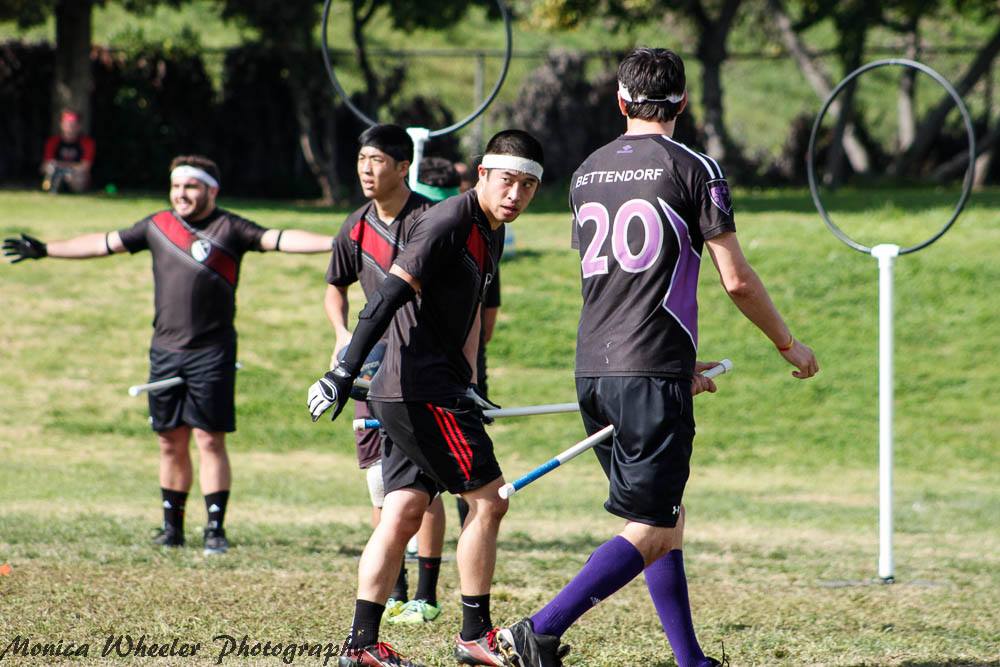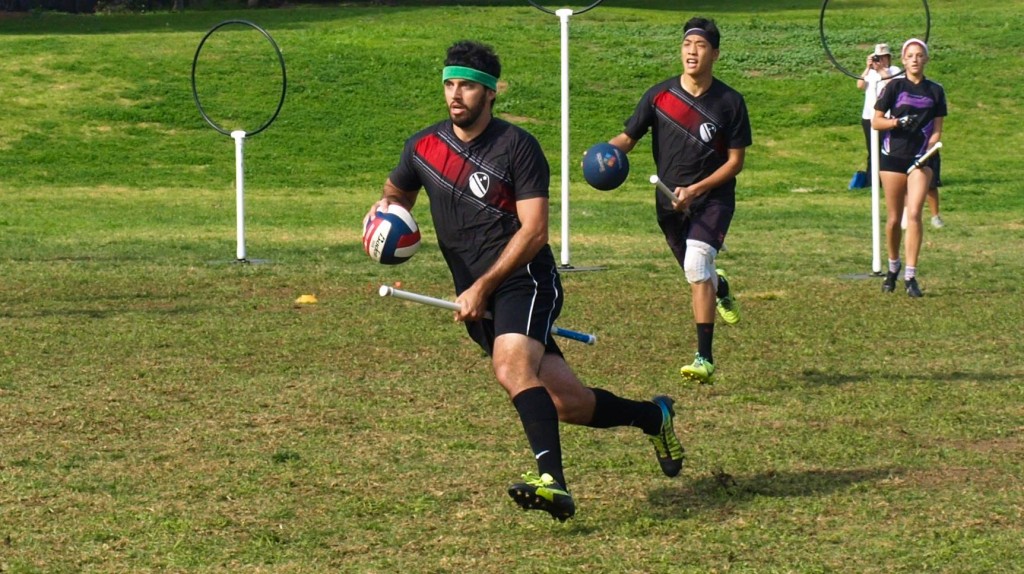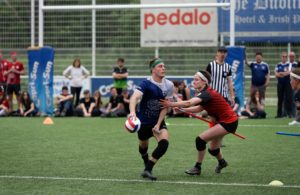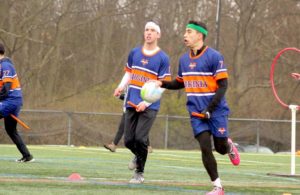- Rule, Britannia, no more?
- Unpopular Opinions: US Quadball Cup 2023
- Proven Contenders: University of Virginia
- Proven Contenders: Rutgers University
- Proven Contenders: University of Michigan
- Proven Contenders: Creighton University
- Different Perspectives: A Look Inside USA Ultimate
- Antwerp QC, Much of Belgian Core, Leaves Competitive Quidditch
Never Say Neverland
- By Ethan Sturm
- Updated: January 27, 2015
It was the heart of last summer, and the numbers just weren’t adding up. Steve DiCarlo, Tony Rodriguez, Alyssa Burton and Amanda Nagy were gone to new community teams. Vanessa Goh was injured. Mitch Cavender was done playing. Dan Hanson was shipping off to Utah. Alex Browne and Missy Sponagle were rumored to want out of competitive quidditch, while Jeff Lin was rumored to not have the time anymore.
There wasn’t just concern that the Lost Boys wouldn’t be good this season. There was actual worry that the team would simply cease to exist.
Come back to the present, and last summer feels like an awfully long time ago. This past weekend, at the LA Open, the Lost Boys were able to return to their dominant form seen a year earlier. The team finished the weekend 7-0, outscoring opponents by an average of over 120 points and letting no team within 80 total quaffle points of them. Along the way, they beat nearly every other contender for the West crown, including the Silicon Valley Skrewts, LA Gambits and UCLA.
The undefeated performance improved the Lost Boys’ record against West opposition to 49-1 in their last 50 games, a run that stretches back to just after their West Regional Championship finals loss to UCLA in March 2013. To put that date into perspective, this site was five months old, Middlebury College was still the defending World Cup champion, Pope Francis was just starting his reign and Boston Strong was still a month away from becoming a thing.
So how did we get here? How did a team in danger of not playing at all this year return to its pedestal as West Regional Championship favorites?
There’s no one answer to this question, but there are definitely some key points. The first, and perhaps most important, is the college pipelines they’ve developed. It’s no surprise that a program that started as “Emerson West” has a strong Emerson College pipeline, but the UCLA pipeline has become just as consistent and just as valuable. At LA Open, the Lost Boys trotted out a starting line of four former UCLA players and two former Emerson players. Their first two off the bench were Jeff Lin, also from UCLA, and Madeleine Wodjak, also from Emerson. Just last week, Griffin Conlogue, a talented chaser and Emerson student whose disagreements with both QC Boston: the Massacre and Emerson left him playing for Boston Riot in the fall, had a transfer request approved to play for the team during his spring semester in Los Angeles.
When you come from Emerson, and you’re in Los Angeles, you play for Lost Boys. It’s that simple.
College pipelines are what have separated the community team haves from the have nots. Between Lost Boys and Lone Star, four of the nation’s 10 strongest programs–University of Texas, Texas A&M University, Emerson and UCLA–almost exclusively feed these teams. These players come as much for the strength of the community programs as they do a chance to enjoy playing a sport they love with those they loved playing alongside. Players on the fence about continuing to play quidditch after school are far more likely to stay under these conditions, and Lone Star and Lost Boys have reaped the benefits.
Compare this to newer community teams like Massacre and LA Gambits. Despite being right in the middle of one of the richest college quidditch environments in the country, Massacre will likely start just two players in the spring that have previously played on a Boston college team. While this is in part due to many people not staying in Boston after school, it’s also because, when deciding whether to keep playing in Boston, players are looking at a team of people they never played with before.
But the Lost Boys’ success comes from more than their recruiting. What they do with those recruits is just as important. Probably the most notable development of a player while in a Lost Boys’ uniform is Chris Seto’s transition from a chaser at Emerson to a Team USA beater with the Lost Boys, but that barely scratches the surface.
At LA Open alone, we were treated to the much-needed coming out parties of both chaser Brooke Lydon and beater Wodjak. With Sponagle and Goh out injured at chaser, and Nagy no longer with the team at beater, the Lost Boys turned to a pair of Emerson alumnae who had logged a combined zero minutes with the school’s A-team. But with years of quidditch experience, along with a heavy dose of tutelage from the Lost Boys veterans, both put on performances that caught the eyes of every analyst at the tournament. Wodjak had the best tournament of her career, allowing the team to break out of their two-male set more than usual, while Lydon produced as a catch-and-release scorer while pestering some elite ballcarriers in her role of point defender in the Lost Boys’ new zone.
Ah yes, the new zone, the one at the heart of the team’s LA Open bracket play run. Given the name Baylito by the team, it’s a man-zone hybrid that keeps two quaffle players at the hoops, one on point and one man-marking the opposing teams greatest off-ball threat, all while allowing the beaters to sit in the horizontal positioning the team prefers. The defense is based on a simple fact: The Lost Boys don’t think their main regional opposition has depth in scoring options, especially at female chaser, where the Lost Boys have pretty much created a monopoly.
Against both Rodriguez in the semifinals and Zach Luce in the finals, the team sat in this zone and dared them to pass. With his main passing option, Ren Bettendorf, still being manned up, Rodriguez forced his way through the zone for a while, but the effort took its toll. When he was forced off the field with cramps, the Lost Boys capitalized to force the Gambits out of the tournament. Luce couldn’t even manage short-term efficiency, as UCLA fell in the finals, managing just 60 points.
Such a major mid-tournament adjustment is a sign of a team confident in itself and is exactly what I criticized the team for not doing last spring in their World Cup bracket play loss to LSU. In that game, the defensive adjustments to double-team Brad Armentor came too late and allowed the Tigers to hang around for too long. But the strategic leadership of this team is different from last year, and we are seeing that play out in real time. Lee and Seto have proven their strategic chops both on the field and off it, with their video analysis being some of the best I’ve seen in all of my years studying the sport, and the implementation of the zone shows a deep understanding of the history of defense in quidditch. Add in Browne, who has led and been part of some of the most organized teams in the sport, from UCLA to Team USA, and you’ve got a triumvirate that will not be scared to pull the trigger on a new formation or look if it’s the team’s best chance to win.
Of course, in the end, this was going to all come back to Browne, who I miraculously managed to leave out of this conversation for over 1000 words. The Lost Boys 49-1 run started just three months after Rodriguez transferred to the Lost Boys from the Hollywood Harpies, and each of those 50 games has been started by either Rodriguez or Browne. Browne’s addition to the Lost Boys in the fall of 2013 came with about as little fanfare as you could ever imagine for a Team USA-caliber player, but looking back, it is the most important thing that ever could have happened for the 2014-15 iteration of the squad. A team that relies so heavily on two-male beater sets absolutely needs a ball handler that can get his, no matter how talented the team’s female chasers. With Rodriguez no longer on the team to help provide that, the burden has fallen almost exclusively on Browne.
So far, Browne has delivered, with a stellar performance at LA Open in which he seemed almost unstoppable at times, slipping through tackles, hurdling beats and unleashing crisp shots and passes to teammates all day long. Put that together with his performance a year ago at Diamond Cup, the only major tournament last season the team was without Rodriguez, and there’s little doubt that Browne is prepared to put this team on his back all season long.
Coming out of LA Open, the West Regional Championship feels pretty over. But the Lost Boys won’t soon forget how long their semifinal match with the Gambits at LA Open was in range. They will not enter their regional resting on their laurels. Coming out in their zone defense allowed them to decide how the game would be played, and I wouldn’t be surprised to see them continue to push their advantage in the Xs and Os. If they can manage to hold their form, they could walk away as the first back-to-back West Regional champs since Arizona State University did it in 2010 and 2011.
Even if they are successful at their regional, a team with the pedigree of Lost Boys will undoubtedly have bigger goals. And while the team has dominated the West over the past two years, they haven’t been nearly as successful against the rest of the country, compiling just an 11-5 record during that time. While three of those losses came to the Southwest’s Big Four, the other two came in World Cup bracket play games—against Bowling Green State University at World Cup VI and LSU at World Cup VII—that the Lost Boys entered as favorites.
The pieces may have changed, but the mentality and composition that has bred success in Los Angeles for two years have remained the same. Despite all of the turmoil and all of the questions, the Lost Boys are right where they were a year ago: a top 10 team, West Regional favorites and one of the biggest threats to take down an elite Southwest team at World Cup. Most people wouldn’t give them the best odds in any of those matchups, but the odds haven’t been with the team all season.
Perhaps, though, that’s only because we misinterpreted what this team was. The Lost Boys are no longer just a place to keep playing quidditch after graduation; they’re a competitive machine with a systematic way of keeping the gears turning.
The Lost Boys have grown up.
Related Posts
About Ethan Sturm
Ethan is the co-founder and former managerial editor and chief correspondent of The Eighth Man. When not talking quidditch, which is rare, he can be found drilling people's teeth and spending time with his elusive wife. He's also the worst.





